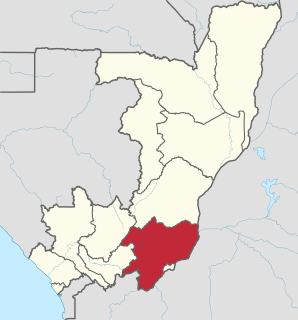 W
WThe 2002–2003 conflict in the Pool Department was a military conflict between the government of the Republic of the Congo and the rebel Ninja militia which lasted from 2002 to 2003. It began in March 2002, when clashes between Ninja militias and the government drove thousands of civilians from their homes. In June, a battle in Brazzaville resulted in 100 people being killed. On 12 March 2003, it was reported by the European Commission that the conflict had left 200,000 people "vulnerable and displaced". The conflict ended on 17 March 2003, when the government and the rebels signed a ceasefire.
 W
WThe 2008 Nord-Kivu campaign was an armed conflict in the eastern Nord-Kivu province of the Democratic Republic of the Congo. The upsurge of violence in the Kivu conflict saw heavy battles between the Democratic Republic of Congo's army, supported by the United Nations, and Tutsi militia under General Laurent Nkunda.
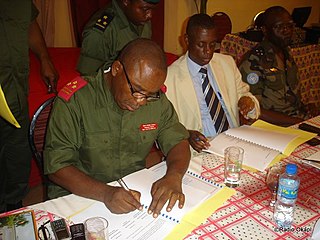 W
WThe 2009 Eastern Congo offensive was a joint Congo-Rwanda military offensive against the Hutu FDLR rebel group descended from those groups that carried out the 1994 Rwanda genocide. Two operations were carried out, 'Kimia II' and 'Umoja Wetu.' 'Kimia' can be translated as 'calm.' "Umoja Wetu" is Swahili for "Our Unity".
 W
WThe Algerian Civil War was a civil war in Algeria fought between the Algerian Government and various Islamist rebel groups from 26 December 1991 to 8 February 2002. The war began slowly as it first appeared the government had successfully crushed the Islamist movement, but armed groups emerged to fight jihad and by 1994, violence had reached such a level that it appeared the government might not be able to withstand it. By 1996–97, it had become clear that the Islamist resistance had lost its popular support, although fighting continued for several years after.
 W
WThe Allied Democratic Forces insurgency is an ongoing conflict waged by the Allied Democratic Forces in Uganda and the Democratic Republic of the Congo, against the governments of those two countries. The insurgency began in 1995, intensifying in 2013, resulting in hundreds of deaths. The ADF is known to currently control a number of hidden camps which are home to about 2,000 people; in these camps, the ADF operates as proto-state with "an internal security service, a prison, health clinics, and an orphanage" as well as schools for boys and girls.
 W
WThe Angolan Civil War was a civil war in Angola, beginning in 1975 and continuing, with interludes, until 2002. The war began immediately after Angola became independent from Portugal in November 1975. The war was a power struggle between two former anti-colonial guerrilla movements, the communist People's Movement for the Liberation of Angola (MPLA) and the anti-communist National Union for the Total Independence of Angola (UNITA). The war was used as a surrogate battleground for the Cold War by rival states such as the Soviet Union, Cuba, South Africa and the United States.
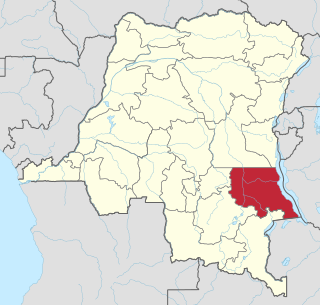 W
WThe Batwa–Luba clashes are a series of ongoing clashes in the Democratic Republic of the Congo (DRC) between the Pygmy Batwa people, and the Luba people starting in 2013.
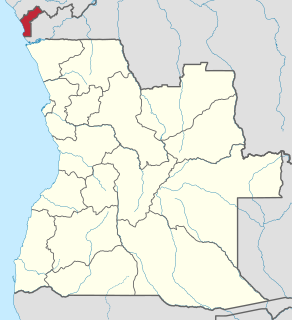 W
WThe Cabinda War is an ongoing separatist insurgency, waged by the Front for the Liberation of the Enclave of Cabinda (FLEC) against the government of Angola. FLEC aims at the restoration of the self-proclaimed Republic of Cabinda, located within the borders of the Cabinda province of Angola.
 W
WThe Caprivi conflict was an armed conflict between the Namibian government and the Caprivi Liberation Army, a rebel group that waged a brief insurrection in 1999 for the secession of the Caprivi Strip.
 W
WThe Casamance conflict is an ongoing low-level conflict that has been waged between the Government of Senegal and the Movement of Democratic Forces of Casamance (MFDC) since 1982. On May 1, 2014 the leader of the MFDC sued for peace and declared a unilateral ceasefire.
 W
WThe Central African Republic Bush War was a civil war in the Central African Republic between Union of Democratic Forces for Unity (UFDR) rebels and government forces. The rebellion began after François Bozizé seized the nation's presidency in 2003. Actual fighting began in 2004. Around 10,000 people were displaced because of the civil unrest.
 W
WThe Central African Republic conflict is an ongoing civil war in the Central African Republic (CAR) involving the government, rebels from the Séléka coalition, and anti-balaka militias.
 W
WAn internal conflict in the Central African Republic (CAR) started essentially on 13 April 2013, when the government of President Michel Djotodia officially took over. The fighting was between the government of the Central African Republic's former Séléka coalition of rebel groups, who are mainly from the Muslim minority, and the mainly Christian anti-balaka coalition. The conflict was part of the ongoing Central African Republic Civil War (2012–present). International organisations, such as the United Nations, had warned of a possible genocide. UNSC resolution 2122 authorised the African-led International Support Mission to the Central African Republic (MISCA) to be deployed to the country, and France to lead operations with additional troops sent to bolster its force in the country. Following a summit of Economic Community of Central African States (CEEAC), including the attendance of all the country's MPs, Djotodia resigned from the presidency on 10 January 2014. The National Transitional Council chose Bangui mayor Catherine Samba-Panza as interim president on 20 January 2014. A period of lawlessness prevailed during the early days of her presidency with people moving into religiously cleansed neighbourhoods as the UN warned of a genocide. Anti-Balaka attacks continued against Muslim civilians.
 W
WThe most recent Chadian Civil War began in December 2005. Since its independence from France in 1960, Chad has been swamped by the civil war between the Arab-Muslims of the north and the Sub-Saharan-Christians of the south. As a result, leadership and presidency in Chad drifted back and forth between the Christian southerners and Muslim northerners. When one side was in power, the other side usually started a revolutionary war to counter it.
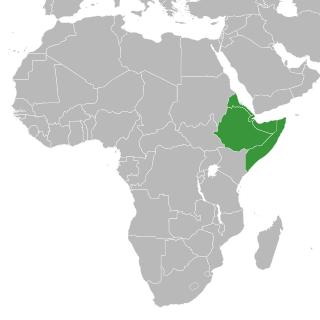 W
WConflicts in the Horn of Africa have been occurring since the 17th century BCE. The Horn of Africa includes the nations of Djibouti, Eritrea, Ethiopia, Somalia and Somaliland.
 W
WThe Congo Crisis was a period of political upheaval and conflict in the Republic of the Congo between 1960 and 1965. The crisis began almost immediately after the Congo became independent from Belgium and ended, unofficially, with the entire country under the rule of Joseph-Désiré Mobutu. Constituting a series of civil wars, the Congo Crisis was also a proxy conflict in the Cold War, in which the Soviet Union and the United States supported opposing factions. Around 100,000 people are believed to have been killed during the crisis.
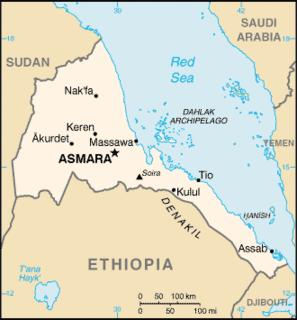 W
WThe Eritrean Civil Wars were two conflicts that were fought between competing organizations for the liberation of Eritrea.
 W
WThe Eritrean–Ethiopian border conflict was a violent standoff and a proxy conflict between Eritrea and Ethiopia. It consisted of a series of incidents along the then-disputed border; including the Eritrean–Ethiopian War of 1998–2000 and the subsequent Second Afar insurgency. The border conflict was a continuation of the Eritrean–Ethiopian War of 1998–2000. It included multiple clashes with numerous casualties, including the Battle of Tsorona in 2016. Ethiopia stated in 2018 that it would cede Badme to Eritrea. This led to the Eritrea–Ethiopia summit on 9 July 2018, where an agreement was signed which demarcated the border and agreed a resumption of diplomatic relations.
 W
WThe Ethiopian Civil War was a civil war in Ethiopia and present day Eritrea, fought between the Ethiopian military junta communist governments and Ethio-Eritrean anti-government rebels from September 1974 to June 1991.
 W
WThe First Congo War (1996–1997), also nicknamed Africa's First World War, was a civil war and international military conflict which took place mostly in Zaire, with major spillovers into Sudan and Uganda. The conflict culminated in a foreign invasion that replaced Zairean President Mobutu Sese Seko with the rebel leader Laurent-Désiré Kabila.
 W
WThe First Ivorian Civil War was a conflict in the Ivory Coast that began in 2002. Although most of the fighting ended by late 2004, the country remained split in two, with a rebel-held north and a government-held south. Hostility increased and raids on foreign troops and civilians rose. As of 2006, the region was tense, and many said the UN and the French military failed to calm the civil war.
 W
WThe First Liberian Civil War was an internal conflict in Liberia from 1989 until 1997. The conflict killed about 250,000 people and eventually led to the involvement of the Economic Community of West African States (ECOWAS) and of the United Nations. The peace did not last long, and in 1999 the Second Liberian Civil War broke out.
 W
WThe First Sudanese Civil War was a conflict from 1955 to 1972 between the northern part of Sudan and the southern Sudan region that demanded representation and more regional autonomy. Half a million people died over the 17 years and the war was divided into four major stages: initial guerrilla warfare, the creation of the Anyanya insurgency, political strife within the government and establishment of the South Sudan Liberation Movement.
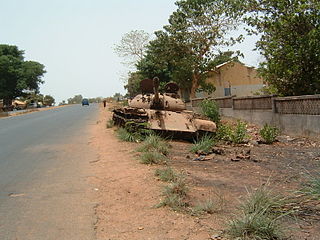 W
WThe Guinea-Bissau Civil War was fought from 7 June 1998 to 10 May 1999 and was triggered by an attempted coup d'état against the government of President João Bernardo Vieira led by Brigadier-General Ansumane Mané. Government forces, backed by neighbouring states, clashed with the coup leaders who had quickly gained almost total control over the country's armed forces.
 W
WThe Insurgency in Ogaden was an armed conflict that took place from 1994 to 2018. It was fought by separatists, the Ogaden National Liberation Front (ONLF), against the Ethiopian government. The war began in 1994, when the ONLF attempted to recreate Greater Somalia by unifying Ethiopia's Somali Region with Somalia. It ended in a peace agreement as part of Prime Minister Abiy Ahmed's reforms.
 W
WThe Ituri conflict was a major conflict between the agriculturalist Lendu and pastoralist Hema ethnic groups in the Ituri region of the north-eastern Democratic Republic of the Congo (DRC). While the two groups had fought since as early as 1972, the name 'Ituri conflict' refers to the period of intense violence between 1999 and 2003. Armed conflict continues to the present day.
 W
WThe 1920-22 Jabal al-Gharbi civil war was a conflict which occurred in the Nafusa Mountains and surrounding areas, in what is today the country of Libya, fought between local tribal leaders competing for political offices in the Tripolitanian Republic.
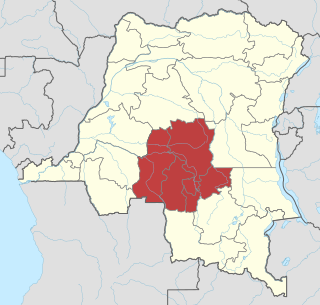 W
WThe Kamwina Nsapu rebellion, also spelled Kamuina Nsapu rebellion, is an ongoing rebellion instigated by the Kamwina Nsapu militia against state security forces in the provinces of Kasaï-Central, Kasaï, Kasai-Oriental, Lomami and Sankuru. The fighting began after the militia, led by Kamwina Nsapu, attacked security forces in August 2016.
 W
WThe Katanga insurgency refers to the ongoing rebellion by a number of rebel groups in the Democratic Republic of the Congo, some of which aim for the creation of a separate state within Katanga. While the insurgency has been active in various forms since 1960, insurgent groups have recently redoubled their efforts after the 2011 jail break that freed Gédéon Kyungu Mutanga, who now commands the majority of the Katangese separatist groups.
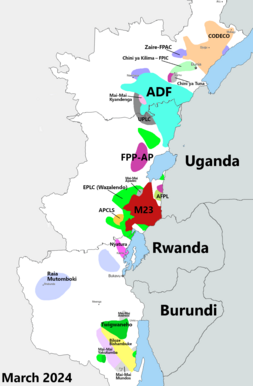 W
WThe Kivu conflict began in 2004 in the eastern Congo as an armed conflict between the military of the Democratic Republic of the Congo (FARDC) and the Hutu Power group Democratic Forces for the Liberation of Rwanda (FDLR) in the Democratic Republic of the Congo. It has broadly consisted of three phases, the third of which is an ongoing conflict. Prior to March 2009, the main combatant group against the FARDC was the National Congress for the Defence of the People (CNDP). Following the cessation of hostilities between these two forces, rebel Tutsi forces, formerly under the command of Laurent Nkunda, became the dominant opposition to the government forces.
 W
WThe First Libyan Civil War was an armed conflict in 2011 in the North African country of Libya fought between forces loyal to Colonel Muammar Gaddafi and foreign supported groups seeking to oust his government. It erupted with the Libyan Revolution, also known as the 17 February Revolution. The war was preceded by protests in Zawiya on 8 August 2009 and finally ignited by protests in Benghazi beginning on Tuesday, 15 February 2011, which led to clashes with security forces that fired on the crowd. The protests escalated into a rebellion that spread across the country, with the forces opposing Gaddafi establishing an interim governing body, the National Transitional Council.
 W
WThe Second Libyan Civil War is an ongoing conflict among rival factions seeking control of Libya.
 W
WOpération Licorne was the name of the French Armed Forces's peacekeeping operation in support of the United Nations Operation in Côte d'Ivoire. The French forces have been stationed in the country since shortly after the outbreak of the Ivorian Civil War. The troops' main mission was to support the United Nations peacekeeping mission and to ensure the security of French and foreign nationals.
 W
WThe Lord's Resistance Army insurgency is an ongoing guerrilla campaign waged by the Lord's Resistance Army (LRA) insurgent group since 1987. Currently, there is low-level LRA activity in eastern Democratic Republic of the Congo and the Central African Republic. The movement is led by Joseph Kony, who proclaims himself the "spokesperson" of God and a spirit medium. It aims to overthrow Yoweri Museveni's Ugandan government and establish a theocratic state based on the Ten Commandments and Acholi tradition.
 W
WThe M23 rebellion was fighting in North Kivu, Democratic Republic of the Congo (DRC), that occurred between the March 23 Movement and government forces. The rebellion was part of continued fighting in the region after the formal end of the Second Congo War in 2003. It broke out in 2012 and continued into 2013, when a peace agreement was made among eleven African nations, and the M23 troops surrendered in Uganda.
 W
WThe Mali War is an ongoing armed conflict that started in January 2012 between the northern and southern parts of Mali in Africa. On 16 January 2012, several insurgent groups began fighting a campaign against the Malian government for independence or greater autonomy for northern Mali, which they called Azawad. The National Movement for the Liberation of Azawad (MNLA), an organization fighting to make this area of Mali an independent homeland for the Tuareg people, had taken control of the region by April 2012.
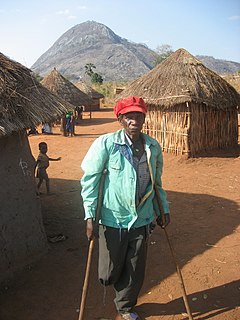 W
WThe Mozambican Civil War was a civil war fought in Mozambique from 1977 to 1992. Like many regional African conflicts during the late twentieth century, the Mozambican Civil War possessed local dynamics but was also exacerbated greatly by the polarizing effects of Cold War politics. The war was fought between Mozambique's ruling Marxist Front for the Liberation of Mozambique (FRELIMO), the anti-communist insurgent forces of the Mozambican National Resistance (RENAMO), and a number of smaller factions such as the PRM, UNAMO, COREMO, UNIPOMO, and FUMO.
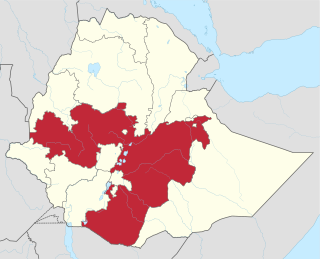 W
WThe Oromo conflict is longstanding conflicts between Oromian separatists and the Government of Ethiopia. The OLF originally fought the Ethiopian Empire to liberate Oromo people and establish an independent Oromia state along with ELF and TPLF. Despite being the largest ethnic group with more than a third of the country’s population, the Oromo people have historically been marginalized from central roles in national politics and, many say, borne the brunt of historical injustices. The conflict began in 1973, when Oromo nationalists established the OLF and its armed wing, the Oromo Liberation Army (OLA).
 W
WThe Rhodesian Bush War—also called the Second Chimurenga and the Zimbabwe War of Liberation—was a civil conflict from July 1964 to December 1979 in the unrecognised country of Rhodesia . The conflict pitted three forces against one another: the Rhodesian white minority-led government of Ian Smith ; the Zimbabwe African National Liberation Army, the military wing of Robert Mugabe's Zimbabwe African National Union; and the Zimbabwe People's Revolutionary Army of Joshua Nkomo's Zimbabwe African People's Union.
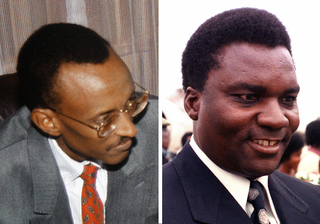 W
WThe Rwandan Civil War was a large-scale civil war in Rwanda fought between the Rwandan Armed Forces, representing the country's government, and the rebel Rwandan Patriotic Front (RPF) from 1 October 1990 to 18 July 1994. The war arose from the long-running dispute between the Hutu and Tutsi groups within the Rwandan population. A 1959–1962 revolution had replaced the Tutsi monarchy with a Hutu-led republic, forcing more than 336,000 Tutsi to seek refuge in neighbouring countries. A group of these refugees in Uganda founded the RPF which, under the leadership of Fred Rwigyema and Paul Kagame, became a battle-ready army by the late 1980s.
 W
WThe Second Afar insurgency is an ongoing insurgency in the Afar Region of Ethiopia and the Southern Red Sea Region of Eritrea, waged by various Afar rebel groups. Both Ethiopia and Eritrea have supported different rebel groups in the region in a proxy war, and have occasionally engaged in border skirmishes with each other, as well as with opposing rebel groups.
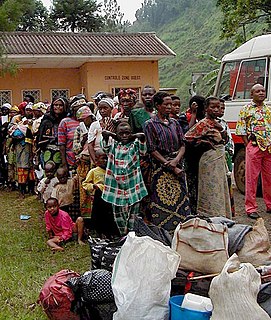 W
WThe Second Congo War began in the Democratic Republic of the Congo in August 1998, little more than a year after the First Congo War, and involved some of the same issues. The war officially ended in July 2003, when the Transitional Government of the Democratic Republic of the Congo took power. Although a peace agreement was signed in 2002, violence has continued in many regions of the country, especially in the east. Hostilities have continued since the ongoing Lord's Resistance Army insurgency, and the Kivu and Ituri conflicts.
 W
WThe Second Ivorian Civil War broke out in March 2011 when the crisis in Ivory Coast escalated into full-scale military conflict between forces loyal to Laurent Gbagbo, the President of Ivory Coast since 2000, and supporters of the internationally recognised president-elect Alassane Ouattara. After months of unsuccessful negotiations and sporadic violence between supporters of the two sides, the crisis entered a critical stage as Ouattara's forces seized control of most of the country with the help of the UN, with Gbagbo entrenched in Abidjan, the country's largest city. International organizations have reported numerous instances of human rights violations by both sides, in particular in the city of Duékoué where Ouattara's forces killed hundreds of people. Overall casualties of the war are estimated around 3000. The UN and French forces took military action, with the stated objective to protect their forces and civilians. France's forces arrested Gbagbo at his residence on 11 April 2011.
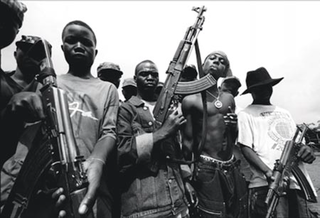 W
WThe Second Liberian Civil War began in 1999 when a rebel group backed by the government of neighbouring Guinea, the Liberians United for Reconciliation and Democracy (LURD), emerged in northern Liberia. In early 2003, a second rebel group, the Movement for Democracy in Liberia (MODEL), emerged in the south, and by June–July 2003, Charles Taylor's government controlled only a third of the country.
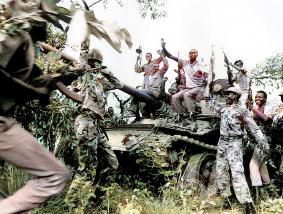 W
WThe Second Sudanese Civil War was a conflict from 1983 to 2005 between the central Sudanese government and the Sudan People's Liberation Army. It was largely a continuation of the First Sudanese Civil War of 1955 to 1972. Although it originated in southern Sudan, the civil war spread to the Nuba mountains and the Blue Nile. It lasted for 22 years and is one of the longest civil wars on record. The war resulted in the independence of South Sudan six years after the war ended.
 W
WThe Sierra Leone Civil War (1991–2002) was a civil war in Sierra Leone that began on 23 March 1991 when the Revolutionary United Front (RUF), with support from the special forces of Charles Taylor’s National Patriotic Front of Liberia (NPFL), intervened in Sierra Leone in an attempt to overthrow the Joseph Momoh government. The resulting civil war lasted 11 years, enveloped the country, and left over 50,000 dead.
 W
WThe Somali Civil War is an ongoing civil war taking place in Somalia. It grew out of resistance to the military junta led by Siad Barre during the 1980s. By 1988–1990, the Somali Armed Forces began engaging various armed rebel groups, including the Somali Salvation Democratic Front in the northeast, the Somali National Movement in the northwest, and the United Somali Congress in the south. The clan-based armed opposition groups overthrew the Barre government in 1991.
 W
WThe South Sudanese Civil War was a conflict in South Sudan between forces of the government and opposition forces. In December 2013, President Kiir accused his former deputy Riek Machar and ten others of attempting a coup d'état. Machar denied trying to start a coup and fled to lead the SPLM – in opposition (SPLM-IO). Fighting broke out between the Sudan People's Liberation Movement (SPLM) and SPLM-IO, igniting the civil war. Ugandan troops were deployed to fight alongside the South Sudanese government. The United Nations has peacekeepers in the country as part of the United Nations Mission in South Sudan (UNMISS).
 W
WThe Sudanese conflict in South Kordofan and Blue Nile is an armed conflict in the Sudanese southern states of South Kordofan and Blue Nile between the Sudanese Army (SAF) and Sudan People's Liberation Movement-North (SPLM-N), a northern affiliate of the Sudan People's Liberation Movement (SPLM) in South Sudan. After some years of relative calm following the 2005 agreement which ended the second Sudanese civil war between the Sudanese government and SPLM rebels, fighting broke out again in the lead-up to South Sudan independence on 9 July 2011, starting in South Kordofan on 5 June and spreading to the neighboring Blue Nile state in September. SPLM-N, splitting from newly independent SPLM, took up arms against the inclusion of the two southern states in Sudan with no popular consultation and against the lack of democratic elections. The conflict is intertwined with the War in Darfur, since in November 2011 SPLM-N established a loose alliance with Darfuri rebels, called Sudan Revolutionary Front (SRF).
 W
WThe Pool War was a conflict between the Republic of the Congo and the Ninja militia in the Pool Department, a department in the southeastern part of the country. Tensions grew between Frédéric Bintsamou and Congolese president Denis Sassou-Nguesso, after Bintsamou contested modifications to the constitution. Bintsamou was formerly a collaborator of Sassou-Nguesso.
 W
WThe Ugandan Bush War, also known as the Luwero War, the Ugandan Civil War or the Resistance War, was a civil war fought in Uganda by the official Ugandan government and its armed wing, the Uganda National Liberation Army (UNLA), against a number of rebel groups, most importantly the National Resistance Army (NRA), from 1980 to 1986.